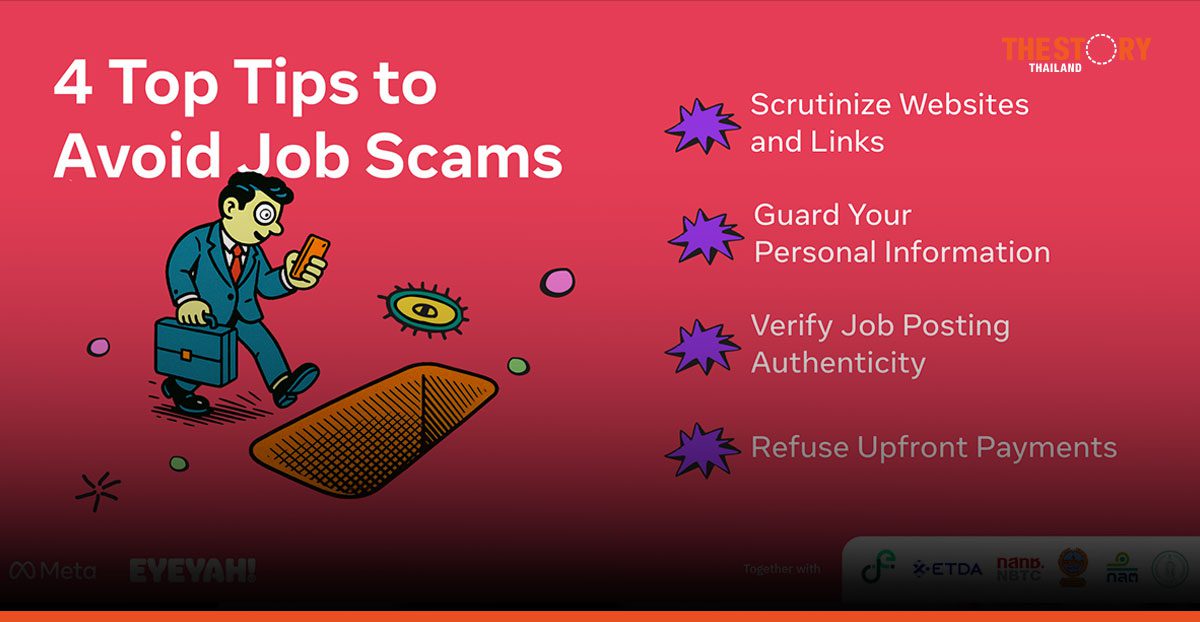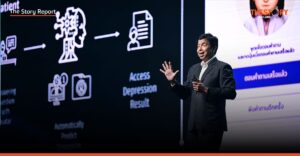Job scams are a growing concern in Thailand, with schemes promising easy money for seemingly simple tasks that result in applicants losing their money instead. Scammers will often advertise job openings using fake pages, profiles, and photos to trick applicants into applying before asking them to pay hidden fees.
According to statistics from the National Cyber Security Agency (NCSA ), online scams have resulted in Thai people losing more than 70 billion baht over the last three years. In addition, reports from the Electronic Transactions Development Agency (ETDA) reveal that scam complaints received though its online support center reached 35,358 in 2024, a 21.74% increase from the year prior, 1,564 of which were specifically related to online investment and job scams, and these numbers continue to grow.
To tackle this ongoing issue, leading technology company Meta has recently partnered with six local government partners, including ETDA, the Bangkok Metropolitan Administration (BMA), the Ministry of Digital Economy and Society (MDES), the Metropolitan Police Bureau (MPB), the National Broadcasting and Telecommunications Commission (NBTC), and the Securities and Exchange Commission (SEC) to educate Thai people on how to spot these types of scams. Under Meta’s “Is this legit?” campaign, the initiative aims to raise awareness about different types of online scams, including job scams, through a series of accessible learning materials and interactive online games, the first of which is available now at https://th.isthislegit.eyeyah.com/.
Here are the top four tips that Thai people should follow to avoid falling for job scams online:
- Scrutinize Websites and Links: Before interacting with any job application profiles or webpages, take the time to check their legitimacy and do your research about the company itself. Also, be extremely cautious about clicking on any suspicious links as these could lead to phishing sites designed to steal your personal data or install malware on your device.
- Guard Your Personal Information: Do not rush to share personal details such as your full address, national ID number, bank account information, or copies of any identification documents, especially early in the application process. Legitimate employers typically request this information only after a formal job offer has been made and accepted.
- Verify Job Posting Authenticity: Always cross-reference job postings with official company websites or reputable job boards. Look for inconsistencies in company names, logos, or contact details. If a job seems too good to be true, it likely is. When possible, contact the company directly through their official channels to confirm the job vacancy.
- Refuse Upfront Payments: A legitimate employer will never ask you to pay money for training, insurance fees, portfolio stock, or any other “service” before you start working or as a condition of employment. Any request for money from a prospective employer is a major red flag and a clear indicator of a scam, even if they are able to give you immediate returns.
Scammers are routinely updating their tactics to avoid detection. Because of this, Thai netizens must be both vigilant and cautious when using the internet, especially when contacted by unknown parties or seeing offers that seem too good to be true.
Discover more about the “Is This Legit?” anti-scam campaign from Meta, in collaboration with BMA, MDES, MPB, NBTC, ETDA, and SEC, to learn how you can identify scammer tricks. Visit https://th.isthislegit.eyeyah.com/ or access the QR link below to try out the interactive game for yourself, and be sure to check out the official Meta Thailand and Bangkok Metropolitan Administration Facebook pages for regular updates on how you can stay safe online.
WGSN unveils strategies for winning the modern consumer
TikTok and 12 partners expand #ThaisAware campaign to combat Cybercrime












